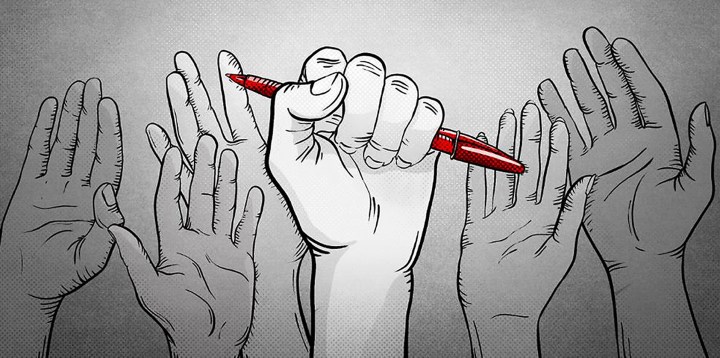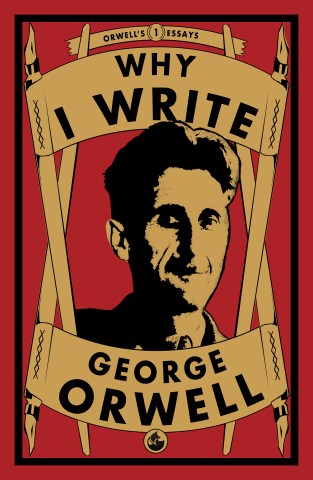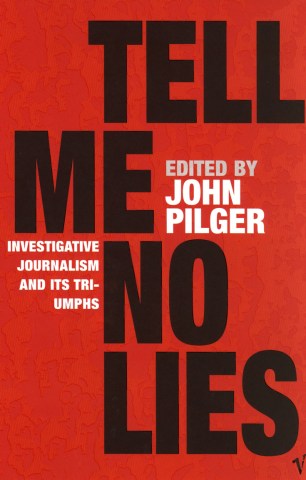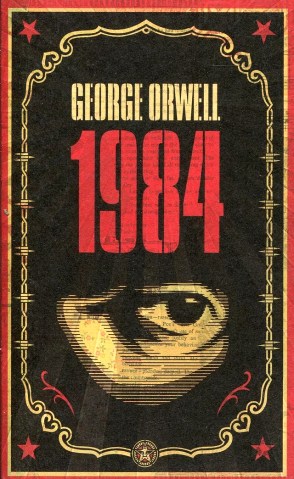TUESDAY EDITORIAL
Maverick Citizens – why we write

‘What I have most wanted to do is to make political writing into an art… my starting point is always a feeling of partisanship, a sense of injustice.’ George Orwell, ‘Why I write’, 1946.
In early September Maverick Citizen turned three years old. My colleague Zukiswa Pikoli marked the day with a retrospective of some of the stories we have covered and photo editor Joyrene Kramer captured the anniversary in a compelling photo essay.
Today, I’d like to complement their contributions with a few lines to you, the readers, about why we write, and to give you a bit of a bird’s eye view of what we write, assuming that sometimes the amount we publish means you can’t see the wood for the trees.
Maverick Citizen aims to produce independent, ethical, objective journalism, but as George Orwell wrote in his 1946 essay Why I Write, we always start from “a sense of injustice”, the need to expose it, explain it and – as importantly – to tell the tales of those who are working day and night to overcome it.
By doing so we hope to aid and affirm those struggles.
As Orwell says: “It seems to me nonsense, in a period like our own, to think that one can avoid writing of such subjects. Everyone writes of them in one guise or another. It is simply a question of which side one takes and what approach one follows. And the more one is conscious of one’s political bias, the more chance one has of acting politically without sacrificing one’s aesthetic and intellectual integrity.”

(Image: renardpress.com)
Joining the dots: ‘Think globally, act locally’
Today all news is interconnected – and connected to social injustice.
For example, pause for a moment and look for a link between the war in Ukraine and the death of 21 children in last week’s horror road crash in Pongola in Northern KwaZulu-Natal.
Believe it or not, there is one…
As the Northern winter approaches, the war in Ukraine, and Russia’s shutting off of gas exports to Europe, has led to a growing international demand for coal. To meet that demand, according to the Sunday Times, local truck drivers are being offered extra pay to deliver more coal, faster, to ports like Richards Bay for export.
Because the drivers are underpaid, without secure employment and not unionised, they seize the opportunity, driving recklessly, for longer hours and risking harm to themselves and, as we saw, the innocent bystanders of social injustice.
On top of this, children, like the kids in Pongola, wouldn’t be crammed into unsafe bakkies if it wasn’t for National Treasury’s policy of cutting public spending (austerity, in other words) which has cut per capita expenditure on children’s constitutional rights to basic education, including on transport to get to schools.
The problem here is State Capture of another kind: capture of our economic policy by unaccountable rating agencies, which is felt most harshly in places like the streets of Pongola, where the Constitution’s promise has lost its meaning.

(Image: penguin.com.au)
That is why many of the stories we publish try to provide a window on the underbelly of our society, where most people live; that’s why we try to provide a platform to people whose lives are embedded in the frontline of injustice. In Tshaba’s Eye, for example, Tshabalira Lebakeng, a homeless writer, tells us about what he sees and hears on the streets of Soweto; Hoseya Jubase gets to the roots of communities in the Eastern Cape; and Lucas Ledwaba and Israel Nkuna often reflect on the lives of people who live in villages in Limpopo.
But joining the dots necessitates that social justice journalism also has an international and regional reach. As John Pilger, in the introduction to his book Tell Me No Lies, writes, “without [investigative journalism] our sense of injustice would lose its vocabulary and people would not be armed with the information they need to fight it”.
In other words, one duty of the media is to ensure that active citizens are informed enough to practise their citizenship at local, national and international level.
This is why, in addition to the local, we are building partnerships with writers in countries like India, the US, Ukraine and Russia and, of course, across Africa.
What’s in an article?
Social justice journalism has a long tail. In South Africa it reaches back to people like John Tengo (JT) Jabavu, the first editor of Isigidimi samaXhosa. However, society has moved on since Orwell wrote, and so has the art of writing. Today, writers have the benefit of technologies Orwell could only dream about darkly in his novel, 1984 – a novel whose division of the world between the great powers of Oceania and Eurasia/Eastasia becomes more prescient with every passing day.
Today, you can embed half a library in an article. The text can be a portal to history, literature and science.
In the process of telling the story, hyperlinks can be used to take you to the stories’ background and context, to other opinions, information and “explainers” that can help readers understand the issue. When Maverick Citizen writes this way our hope is that an article might be more than just fleeting news or opinion, but also be a resource to activists for learning and teaching.
The architecture of Maverick Citizen
But in addition to what we write is the architecture in which we encase it.
Based on what you tell us, and what we learn from scanning the environment, Maverick Citizen’s Tamsin Metelerkamp compiles a weekly Civil Society Watch, a kind of “what’s on” of the next seven days. This is published every Monday morning. Read the latest here: “This week – Pan-African conference, International Day of Awareness on Food Loss and talk on sustainable economies.”
Every Tuesday, our weekly newsletter (subscribe here) provides a compilation of the previous week’s top stories and opinions, and includes an editorial. Our editorials always look at current issues from the bottom up, from the standpoint of social justice; we try to highlight the interests of the poor, the oppressed and increasingly of the planet, with whose health our fate is inextricably bound up.
Cartoons have been part of newspapers for as long as newspapers have existed. But ours are different.
Visit Daily Maverick’s home page for more news, analysis and investigations
With invaluable support and mentoring from veteran cartoonist John Curtis, our Ubuntoonists – Wilson Mgobhozi, Thulani Ntsong and Nathi Ngubane, today joined by Evelyn Munangati (read about them here: Maverick Citizen’s unique brand of editorial cartoons… ) – offer a ground-zero perspective on the news.
Insert last week’s cartoon on children here
Writes and reforms
A friend of mine refers to persistent and unceasing journalism that probes a human rights issue, until it builds up sufficient pressure to bring about necessary reforms, as the art of “writes and reforms”.
Writes and rights, get it?!
In keeping with this, Maverick Citizen’s “writes” often aim to bring about reform in healthcare, accountability, anti-corruption and myriad other issues. Others call this “solutions journalism”.
One such “write” is on the constitutionally protected right to sufficient and healthy food. Many people are not getting their daily bread – despite fervent prayers. Through ongoing investigation and uncovering of the issues that determine What’s Eating Us (the name of a podcast series with Zukiswa Pikoli) Maverick Citizen is trying to advance food justice.
In the past two years we have written more than 100 articles on the subject! Read them here.

(Image: Wikipedia)
On other fronts, we’ve refused to loosen our grip on investigating the corruption and maladministration in the Gauteng health system, and have maintained a laser-like focus on a plethora of social issues in the Eastern Cape, including the collapsing healthcare system.
In both instances our investigations have contributed to reforms.
During the dying days of apartheid it took a rebellious young media, partisan to freedom, to mock the hypocricies, expose the indignities and unmask the cruelty of that system. By doing so, it affirmed and encouraged the liberation movement.
Today’s liberation movement is not a political party. It is a burgeoning civil society, a set of values rooted in openness, diversity and social justice. A similar media is needed again, to report from deep inside what Paul Hawken termed the “Blessed Unrest”; to the take advantage of democratic freedoms while we have them, and to ally itself with the Constitutional vision of social justice and a notion of substantive equality that “includes the full and equal enjoyment of all rights and freedoms”. We need a media that celebrates beauty and agency in order to find energy and purpose to overcome ugliness and paralysis, that sees value in all people’s life and dignity, not just that of the elites and advantaged.
That’s why we write. That is our mission. DM/MC





















 Become an Insider
Become an Insider
Comments - Please login in order to comment.